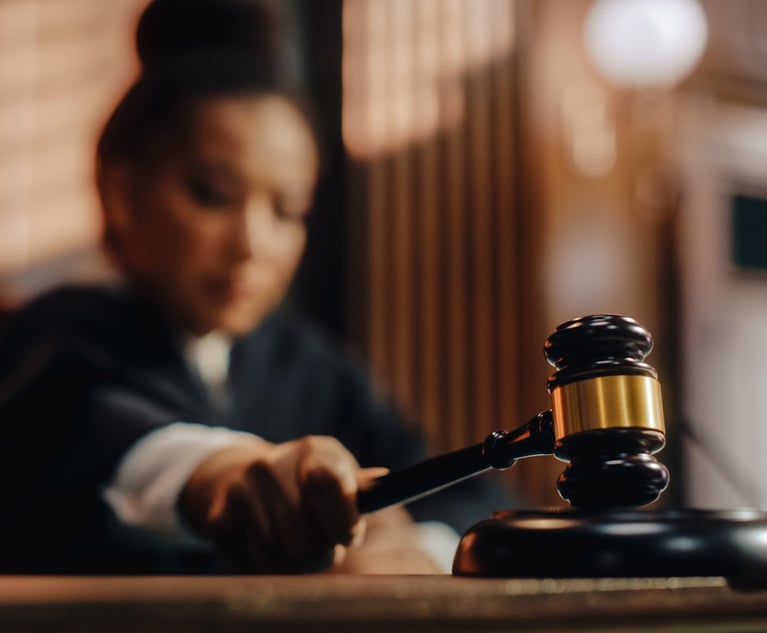Protection Orders for Sex Assault Victims Can Provide Safety
What began as one woman's allegations of sexual misconduct against producer Harvey Weinstein has become a cascade of people speaking out about sexual violence from Hollywood to Wall Street to the media to college campuses across the country.
February 23, 2018 at 03:01 PM
7 minute read

What began as one woman's allegations of sexual misconduct against producer Harvey Weinstein has become a cascade of people speaking out about sexual violence from Hollywood to Wall Street to the media to college campuses across the country. The #MeToo movement is giving a voice to those who have stayed silent for too long. And, it is not just powerful women who are speaking up. The National Sexual Assault Hotline (800-656-HOPE) reported a record increase in calls, 21 percent more than usual, since the #MeToo movement began. It has become clear that sexual assault is much more widespread than previously acknowledged and many survivors no longer have to feel alone. It is also clear that the majority of victims are assaulted by someone they know. According to RAINN, the nation's largest anti-sexual violence organization, seven out of 10 rapes are committed by someone known to the victim. Young people who experience campus sexual assault are even more likely to know their offender as nine out of 10 victims of campus sexual assault knew the person who assaulted them, according to U.S. Department of Justice research.
Civil Protection Order Options in Pennsylvania
As more and more people disclose their sexual assaults, it is likely that an increased number of people will seek a civil protection order. A Protection From Abuse (PFA) order may protect those abused or sexually assaulted by a family or household member, including a current or former intimate partner. But until recently, those assaulted by an acquaintance, and therefore not eligible for a PFA, had little recourse against their attacker outside of the criminal justice system. The Protection of Victims of Sexual Violence or Intimidation Act (PSVI) went into effect in Pennsylvania in July 2015. The PSVI Act provides for two types of orders. The Protection from Intimidation order was created to protect minors from harassment and intimidation from adults who are not family or household members, while the Protection from Sexual Violence order provides protection to both adults and minors who were sexually assaulted by someone who is NOT a family or household member, dating or intimate partner. This relatively new option is a step forward for the legal options available to victims of sexual assault, but it remains underutilized and not well understood.
Which Option Is Right for Your Client
Although PFA and PSVI orders are very similar, there are some important differences. A PFA is available to victims who were assaulted by a partner, spouse or family member. A PSVI is available to victims who were assaulted by a coworker, classmate, stranger, or someone with whom they have no intimate or family relationship. Especially among college students, it may be unclear who qualifies for a PFA as opposed to a PSVI order, as even a brief, informal dating relationship is often enough to qualify for a PFA. Additionally, some victims of sexual violence are not comfortable, or are further traumatized by, identifying the person who assaulted them as an “intimate partner.” In some cases, a PFA may offer greater relief to a victim so it is vital to understand the distinctions between PFA and PSVI orders.
PFA and PSVI orders are intended to prevent further abuse and are available in Philadelphia through the same process by filing at the Family Court building. Emergency orders may be obtained on evenings and weekends at the Criminal Justice Center when the court is unavailable. Both PFA and PSVI orders can prohibit the offender from contacting the victim or entering the victim's home, place of employment, business or school. “No contact” under such orders includes prohibitions against communication via social media and indirect contact through third-parties. Violations of either a PFA or PSVI order can have criminal consequences. Unlike PFA orders, PSVI orders do not automatically contain firearm relinquishment provisions and do not trigger state or federal firearms prohibitions. PFA orders can also prohibit an offender from having contact with a victim's minor children and can include temporary custody provisions. Final PFA and PSVI orders may remain in effect for up to three years and are available whether or not a victim chooses to pursue criminal prosecution.
PSVI Case Law
Since PSVI orders are relatively new, official data on the number of filings is unavailable and there are very few cases interpreting the law. A recent Pennsylvania Superior Court decision, E.A.M. v. A.M.D., III, No. 515 WDA 2016, Oct. 26, 2017, affirmed a Final PSVI order and clarified the burden of proof in PSVI cases, as well as the standard of review. The court held that, just as in PFA cases, the standard of appellate review is an abuse of discretion or an error of law, and the burden of proof in a PSVI action is a preponderance of the evidence. In that case, the appellant had argued that the appellee had failed to prove beyond a reasonable doubt that she was the victim of sexual violence. The court rejected the argument and found that a criminal conviction or other finding beyond a reasonable doubt is not a prerequisite to pursuing a PSVI order and that a petitioner need only assert that they were the victim of sexual violence, as long as the court finds the assertion credible. Additionally, the court found that protecting victims of sexual violence from ongoing “mental or emotional harm” by protecting them from contact with their assailant was indeed the intent of the law. These distinctions are important as they allow victims to choose the legal options that work best for them.
Conclusion
A PSVI order can provide a civil remedy to those who have been sexually assaulted by a stranger or an acquaintance who is not a family or household member, whether or not the victim chooses to pursue criminal prosecution. Although it is similar to a PFA order, a PSVI order does not provide all of the remedies a PFA order can provide, so it is vital to have an attorney who understands the distinctions and can effectively argue for all the possible relief in a PSVI order. As the youth and young adult staff attorney at WAA, I represent young people age 24 and under, and anyone enrolled at a local college or university, in PFA and PSVI cases. I also provide outreach regarding PSVI to area colleges and universities. Education on safety options is critical for young people who are at an increased risk of sexual violence and it is especially important during a time when greater numbers of people are disclosing sexual assault. If you or someone you know is in need of legal assistance, or if you are interested in hosting a PSVI educational event, please contact the Women Against Abuse Legal Center at 215-686-7082. The Philadelphia Domestic Violence Hotline (1-866-723-3014) is available 24 hours a day for crisis intervention, safety planning, resources and referrals.
This project is supported by Grant No. 2015-CY-AX-0010 and 2016-WL-AX-0036 awarded by the Office of Violence Against Women, Department of Justice. The opinions, findings, conclusions and recommendations expressed in this publication/program/exhibition are those of the author(s) and do not necessarily reflect the views of the Department of Justice, Office on Violence Against Women.
Lauren McCulloch is the youth and young adult staff attorney at Women Against Abuse, funded by the U.S. Department of Justice, Office of Violence Against Women.
This content has been archived. It is available through our partners, LexisNexis® and Bloomberg Law.
To view this content, please continue to their sites.
Not a Lexis Subscriber?
Subscribe Now
Not a Bloomberg Law Subscriber?
Subscribe Now
NOT FOR REPRINT
© 2025 ALM Global, LLC, All Rights Reserved. Request academic re-use from www.copyright.com. All other uses, submit a request to [email protected]. For more information visit Asset & Logo Licensing.
You Might Like
View All
Phila. Court System Pushed to Adapt as Justices Greenlight Changes to Pa.'s Civil Jury Selection Rules
5 minute read
Pa. Appeals Court: Trial Judge Dismissed Med Mal Claims Without Giving Plaintiffs Proper Time to Fight Back
4 minute read
Disjunctive 'Severe or Pervasive' Standard Applies to Discrimination Claims Against University, Judge Rules
5 minute readTrending Stories
- 1The FTC’s Noncompete Rule Is Likely Dead
- 2COVID-19 Vaccine Suit Against United Airlines Hangs on Right-to-Sue Letter Date
- 3People in the News—Jan. 10, 2025—Lamb McErlane, Saxton & Stump
- 4How I Made Partner: 'Be Open With Partners About Your Strengths,' Says Ha Jin Lee of Sullivan & Cromwell
- 5Essential Labor Shifts: Navigating Noncompetes, Workplace Politics and the AI Revolution
Who Got The Work
Michael G. Bongiorno, Andrew Scott Dulberg and Elizabeth E. Driscoll from Wilmer Cutler Pickering Hale and Dorr have stepped in to represent Symbotic Inc., an A.I.-enabled technology platform that focuses on increasing supply chain efficiency, and other defendants in a pending shareholder derivative lawsuit. The case, filed Oct. 2 in Massachusetts District Court by the Brown Law Firm on behalf of Stephen Austen, accuses certain officers and directors of misleading investors in regard to Symbotic's potential for margin growth by failing to disclose that the company was not equipped to timely deploy its systems or manage expenses through project delays. The case, assigned to U.S. District Judge Nathaniel M. Gorton, is 1:24-cv-12522, Austen v. Cohen et al.
Who Got The Work
Edmund Polubinski and Marie Killmond of Davis Polk & Wardwell have entered appearances for data platform software development company MongoDB and other defendants in a pending shareholder derivative lawsuit. The action, filed Oct. 7 in New York Southern District Court by the Brown Law Firm, accuses the company's directors and/or officers of falsely expressing confidence in the company’s restructuring of its sales incentive plan and downplaying the severity of decreases in its upfront commitments. The case is 1:24-cv-07594, Roy v. Ittycheria et al.
Who Got The Work
Amy O. Bruchs and Kurt F. Ellison of Michael Best & Friedrich have entered appearances for Epic Systems Corp. in a pending employment discrimination lawsuit. The suit was filed Sept. 7 in Wisconsin Western District Court by Levine Eisberner LLC and Siri & Glimstad on behalf of a project manager who claims that he was wrongfully terminated after applying for a religious exemption to the defendant's COVID-19 vaccine mandate. The case, assigned to U.S. Magistrate Judge Anita Marie Boor, is 3:24-cv-00630, Secker, Nathan v. Epic Systems Corporation.
Who Got The Work
David X. Sullivan, Thomas J. Finn and Gregory A. Hall from McCarter & English have entered appearances for Sunrun Installation Services in a pending civil rights lawsuit. The complaint was filed Sept. 4 in Connecticut District Court by attorney Robert M. Berke on behalf of former employee George Edward Steins, who was arrested and charged with employing an unregistered home improvement salesperson. The complaint alleges that had Sunrun informed the Connecticut Department of Consumer Protection that the plaintiff's employment had ended in 2017 and that he no longer held Sunrun's home improvement contractor license, he would not have been hit with charges, which were dismissed in May 2024. The case, assigned to U.S. District Judge Jeffrey A. Meyer, is 3:24-cv-01423, Steins v. Sunrun, Inc. et al.
Who Got The Work
Greenberg Traurig shareholder Joshua L. Raskin has entered an appearance for boohoo.com UK Ltd. in a pending patent infringement lawsuit. The suit, filed Sept. 3 in Texas Eastern District Court by Rozier Hardt McDonough on behalf of Alto Dynamics, asserts five patents related to an online shopping platform. The case, assigned to U.S. District Judge Rodney Gilstrap, is 2:24-cv-00719, Alto Dynamics, LLC v. boohoo.com UK Limited.
Featured Firms
Law Offices of Gary Martin Hays & Associates, P.C.
(470) 294-1674
Law Offices of Mark E. Salomone
(857) 444-6468
Smith & Hassler
(713) 739-1250






